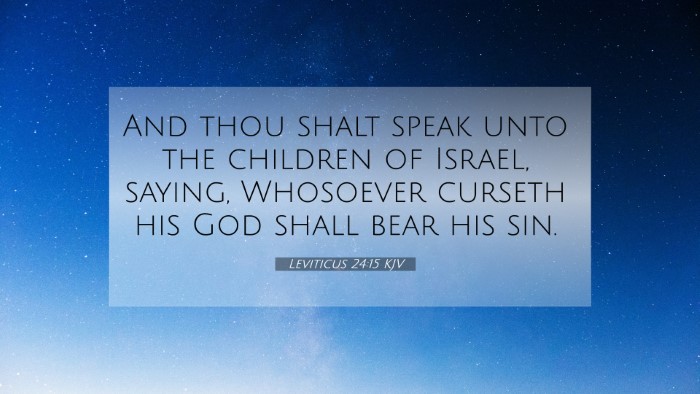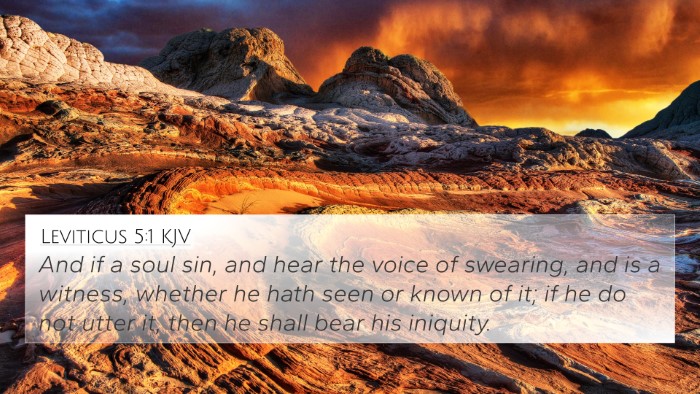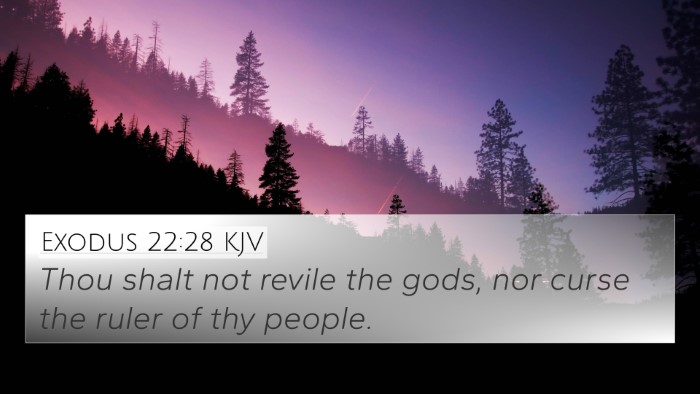Understanding Leviticus 24:15
Leviticus 24:15 states:
"And you shall speak to the children of Israel, saying: 'Whoever curses his God shall bear his sin.'" (Leviticus 24:15, NKJV)
Verse Meaning and Interpretation
This verse addresses the serious issue of blasphemy and the consequences of cursing God. It reflects the holiness of God's name and the gravity of taking His name in vain. Various public domain commentaries provide insights into this important biblical principle.
Insights from Matthew Henry
Matthew Henry emphasizes that the act of cursing God is not only a grave offense but also an unpardonable sin without sincere repentance. He remarks that the community should regard the holiness of God’s name and emphasizes the importance of showing reverence for the deity.
Insights from Albert Barnes
Albert Barnes elaborates that the verse serves as a warning to the Israelites about the danger of irreverence toward God. He describes how the community must uphold God's honor, and failing to do so would require accountability for one’s actions. The clear implications of personal responsibility and communal accountability are highlighted in his commentary.
Insights from Adam Clarke
Adam Clarke provides additional context, noting the cultural background of the ancient Israelites and how their societal laws were intertwined with their worship practices. He reinforces the idea that words matter and that speaking against God has dire consequences, thereby reaffirming the importance of maintaining purity in speech and thoughts.
Key Themes of the Verse
- The Holiness of God: The verse underscores the need for reverence towards God’s name.
- Accountability for Actions: It emphasizes that individuals must bear the consequences of their words.
- Community Standards: The repercussions of cursing God reflect communal values and shared standards of worship.
Related Bible Cross-References
- Exodus 20:7: "You shall not take the name of the Lord your God in vain..." - This verse reinforces the sanctity of God's name.
- Matthew 12:36-37: "But I say to you that for every idle word men may speak, they will give account of it in the day of judgment..." - This highlights accountability for spoken words.
- James 3:9-10: "With it we bless our God and Father, and with it we curse men..." - Attributed to the misuse of speech.
- Isaiah 8:21-22: "They will pass through it hard pressed and hungry; and it shall happen... they will curse their king..." - A prophetic warning against blasphemy amid distress.
- 1 Timothy 6:1: "Let as many bondservants as are under the yoke count their own masters worthy of all honor..." - This reflects the principles of respect and honor.
- Proverbs 18:21: "Death and life are in the power of the tongue..." - A reminder about the impact of our words.
- Colossians 3:8: "But now you yourselves are to put off all these: anger, wrath, malice, blasphemy..." - A call to purify one’s speech.
Thematic Bible Verse Connections
When we engage in comparative Bible verse analysis, we notice significant themes that emerge from Leviticus 24:15 and its cross-references:
- Respect for Authority: From Exodus 20:7, we learn that God’s authority requires respect and honor.
- Consequences of Speech: Passages like Matthew 12:36-37 echo the notion that our speech holds weight in spiritual realms.
- Community Responsibility: As seen in Isaiah 8:21-22, our words can impact not just the speaker but the entire community.
Tools for Bible Cross-Referencing
For those looking to explore scripture more deeply, utilizing a Bible concordance or a Bible cross-reference guide can be invaluable. Here are some methods for effective cross-referencing:
- Use a comprehensive Bible cross-reference system to track themes across both Old and New Testaments.
- Engage in cross-referencing Bible studies with a group to expand understanding.
- Identify connections between Bible verses through topical studies or thematic analysis.
Practical Applications
This verse not only informs theological discourse but also invites personal introspection. Believers are encouraged to:
- Evaluate the words they speak in both private and public settings.
- Reflect on their relationship with God and how it influences communication.
- Engage in practices that promote reverence for God's name, both personally and within their communities.
Conclusion
Leviticus 24:15 serves as a compelling reminder of the power of words and the seriousness of honoring God. By engaging in inter-Biblical dialogue and cross-referencing related verses, believers can gain deeper insight into the nature of their faith and the importance of their expressions thereof. This verse encourages not just reflection but purposeful action in maintaining respect for the Divine.






